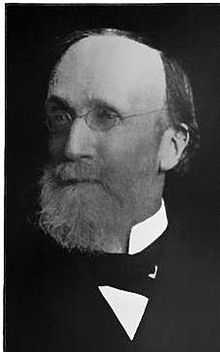Thomas Day Seymour

Thomas Day Seymour (April 1, 1848 – December 31, 1907)[1] was an American classical scholar.[2]
Life
Born in Hudson, Ohio, Seymour graduated with a B.A. in 1870 at Western Reserve College,[2] where his father, Nathan Perkins Seymour, was Long Professor of Greek and Latin. He received an ad eundem degree from Yale in 1870, and honorary LL.D. degrees from Western Reserve in 1894,[2] from Glasgow University in 1901, and from Harvard University in 1906.[1]
After studying in Berlin and Leipzig and making many visits to Greece,[1] Seymour returned to Western Reserve College as professor of Greek from 1872-1880 before becoming professor of Greek at Yale University in 1880, holding his position until his death in New Haven.[1]
From 1887 to 1901 Seymour was chairman of the managing committee of the American School of Classical Studies at Athens,[2] and was president of the Archaeological Institute of America from 1903. He was one of the American editors of the Classical Review.[1][3]
He was the father of Yale President Charles Seymour, and the great-nephew of Yale President Jeremiah Day.
He married Sarah Melissa Hitchcock (b. Sep. 27, 1846) of Burton, Ohio on July 2, 1874. She was the granddaughter of Justice Peter Hitchcock.[2] They had three children; Elizabeth Day Seymour (b. Jan 21, 1876) was his eldest daughter, and she married John Angel (sculptor) in 1942.[4] Clara Hitchcock Seymour was born on March 28, 1880 and his youngest child Charles Seymour was born on Jan. 1, 1885.[2]
Publications
Other than his Selected Odes of Pindar (1882),[5] Seymour's published work was largely confined to the study of the Homeric poems, viz:
- "On the Date of the Prometheus of Aeschylus" (1879)[6]
- An Introduction to the Language and Verse of Homer (1885)[7]
- Homer's Iliad, i.-iv. (1887-1890)
- Homeric Vocabulary (1889)[8]
- "Carroll Cutler" (1894)[9]
- Introduction and Vocabulary to School Odyssey (1897)
- The College Series of Greek Authors, editor with Lewis R Packard and John W White.
- Plato: Apology of Socrates and Crito (1885) Ginn & Co.[10]
- "The First Twenty Years of the School At Athens" (1902)[11]
- Life in the Homeric Age (1907)[12]
References
- ↑ 1.0 1.1 1.2 1.3 1.4 "Obituary: Thomas Day Seymour" (1910) The Classical Review Vol.23 p.26 David Nutt, London; Ginn & Co., Boston
- ↑ 2.0 2.1 2.2 2.3 2.4 2.5 The Family of the Rev. Jeremiah Day of New Preston to January 1, 1900: A Genealogical Appendix to The Chronicles of the Day Family (1900) The Tuttle, Morehouse & Taylor Co., New Haven, Conn.
- ↑ Eight extracts from The Classical Review (March, 1899 – October, 1901) David Nutt, London; Ginn & Co., Boston
- ↑ "John Angel". Mapping the Practice and Profession of Sculpture in Britain & Ireland 1851-1951. University of Glasgow History of Art and HATII, online database. 2011. Retrieved September 6, 2012.
- ↑ Selected Odes of Pindar: With Notes and an Introduction (1882) Ginn, Heath & Company, Boston
- ↑ "On the Date of the Prometheus of Aeschylus" (1879) Transactions of American Philological Society
- ↑ An Introduction to the Language and Verse of Homer (1885) Ginn & Co., Boston
- ↑ A Concise Vocabulary to the First Six Books of Homer's Iliad (1889) Ginn & Co., Boston (Google eBook)
- ↑ "Address in Memory of Rev. Carroll Cutler, D. D., Fourth President of Adelbert College of Western Reserve University" (1894)
- ↑ Plato Apology of Socrates and Crito (1885) Ginn & Co.
- ↑ "Bulletin of the School of Classical Studies at Athens" Vol.5 (1902) Archaeological Society of America
- ↑ Life in the Homeric Age (1908) The Macmillan Company, New York (Google eBook)
 This article incorporates text from a publication now in the public domain: Chisholm, Hugh, ed. (1911). Encyclopædia Britannica (11th ed.). Cambridge University Press.
This article incorporates text from a publication now in the public domain: Chisholm, Hugh, ed. (1911). Encyclopædia Britannica (11th ed.). Cambridge University Press.
External links
- Works by Thomas Day Seymour at Project Gutenberg
- Works by or about Thomas Day Seymour at Internet Archive
|